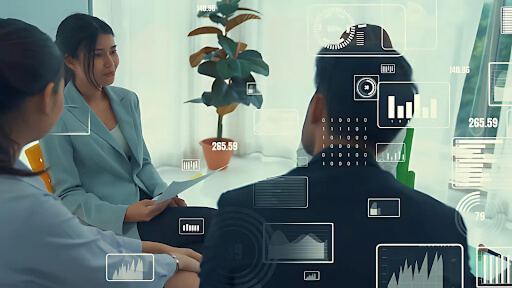 1-800-805-5783
1-800-805-5783 
Choosing the right AI system for your business used to mean picking a chatbot or a data-crunching tool. Not anymore. With the rise of Agentic AI frameworks, we’re stepping into an entirely new way of working—one where AI doesn’t just respond to commands, it actively drives outcomes.
But let’s be real—this shift brings a lot of questions. Where do you start? How do you choose a system that actually helps (and doesn’t just sound impressive in meetings)? Most importantly, how do you align these powerful tools with your actual business goals?
Let’s break it all down—no jargon, no hype—just practical guidance on how to pick the best Agentic AI workflows for what you’re trying to achieve.
In simple terms, Agentic AI frameworks allow AI systems (or “agents”) to operate with a degree of independence. Unlike traditional automation, which relies on static rules, these agents analyze, decide, and act—all while adapting in real time.
Think of them like intelligent teammates. They don’t just follow instructions. They understand the context, break down goals into subtasks, make decisions on your behalf, and even integrate other tools or systems when needed.
This isn’t about replacing people. It’s about offloading the busywork, the repetition, and the bottlenecks so your team can focus on strategy and creativity.
And as these systems grow more advanced, they’re starting to become part of long-term workflows—running internal audits, mapping out product roadmaps, or even managing vendor relationships based on evolving needs.
According to a 2024 Gartner report, over 40% of enterprise tasks will be handled by autonomous or agentic AI systems by 2026—a clear sign that this isn’t a passing trend.

Before you dive into tools, think about what you need.
Are you looking to:
Every goal has a different workflow behind it. The proper Agentic AI frameworks don’t just handle tasks—they align with your business’s structure and priorities.
Pro tip: Write down the exact outcome you want. Not just “automate reporting,” but “generate weekly client-ready reports with key performance trends by 9 AM every Monday.” The more specific you are, the easier it is to pick the right agent.
Choosing the proper Agentic AI frameworks means understanding the various types of agent workflows available. Here are a few of the most common:
1. Goal-Oriented Agents
These agents work toward a defined outcome, like completing a market analysis, preparing a budget, or summarizing legal documents. You give them the goal, and they figure out the steps to achieve it.
2. Multi-Agent Systems
In these Agentic AI frameworks, multiple AI agents collaborate like a digital team. One gathers data, another writes content, a third fact-checks, and so on. Ideal for complex workflows like R&D, campaign development, or enterprise-level automation.
3. Event-Driven Agents
These agents respond to triggers, like a drop in sales, a customer complaint, or a change in website traffic. They can take action, notify the right person, or run diagnostics autonomously.
Each of these Agentic AI frameworks supports different needs. Some are reactive, others are proactive. Some work solo, while others work in a group. Matching the type to your business model is where the magic happens.

Let’s assume you’ve clarified your goals and know which type of agent you’re looking for. Now it’s time to choose the Agentic AI frameworks. Here’s what to look for:
Autonomy With Guardrails
A great AI agent should work independently, but not uncontrollably. Look for Agentic AI frameworks that offer human-in-the-loop oversight or customizable permissions. You want the AI to act, but not go rogue.
Multi-Step Reasoning
The best Agentic AI frameworks support agents that don’t just respond—they plan. For example, if your goal is to “launch a newsletter,” an intelligent agent can break it into steps: ideation, writing, scheduling, testing, and sending.
Interoperability
Does the agent work with your existing tools—like Slack, Google Docs, Notion, HubSpot, or Salesforce? The more natively it integrates, the more powerful it becomes.
A recent McKinsey study found that companies integrating agentic AI frameworks into their toolsets improved workflow efficiency by up to 35%, primarily due to reduced tool switching and manual coordination.
Transparency and Logs
You should be able to see what the agent did, why it chose that action, and what the result was. Trust builds through transparency.
Feedback Loops
The strongest Agentic AI frameworks let you fine-tune based on results. If the output isn’t quite right, you can coach the agent, just like you would a team member.
Let’s say you’re a growth marketing team trying to scale personalized outbound emails. Instead of manually writing each one or creating endless templates, an AI agent could:
That’s not science fiction—it’s happening now. And it’s all built on Agentic AI frameworks that support dynamic reasoning, goal tracking, and tool orchestration.
Other use cases:

You don’t have to rebuild your tech stack to get started. Here’s a simple way to test:
You’ll be amazed how quickly a well-configured AI agent can go from “nice to have” to “I can’t imagine working without this.”

Choosing the right Agentic AI frameworks isn’t about finding the flashiest features. It’s about activating outcomes. When done right, Agentic AI doesn’t just save you time. It helps your business think faster, respond smarter, and operate with less friction.
If you’re feeling stuck or overwhelmed, start with your business goal. What would make your day easier? What task slows your team down every week?
That’s where your first agent belongs.
And if you choose the proper Agentic AI frameworks, it won’t just do the work—it’ll learn how to do it better the next time.
1. What are Agentic AI frameworks?
Agentic AI frameworks are systems that enable AI agents to make decisions, plan tasks, and act independently toward a goal, without needing step-by-step human input.
2. How are Agentic AI workflows different from traditional automation?
Traditional automation follows fixed rules. Agentic AI workflows adapt in real time, learn from outcomes, and handle complex, multi-step tasks more intelligently.
3. What types of business goals can Agentic AI support?
Agentic AI can assist with lead generation, customer support, reporting, marketing automation, document analysis, and internal operations, especially in situations where repetitive or multi-step workflows are present.
4. How do I choose the proper Agentic AI framework?
Start by defining your business goal, then look for a framework that supports autonomous planning, integrates with your tools, and allows human oversight.
At [x]cube LABS, we craft intelligent AI agents that seamlessly integrate with your systems, enhancing efficiency and innovation:
Integrate our Agentic AI solutions to automate tasks, derive actionable insights, and deliver superior customer experiences effortlessly within your existing workflows.
For more information and to schedule a FREE demo, check out all our ready-to-deploy agents here.